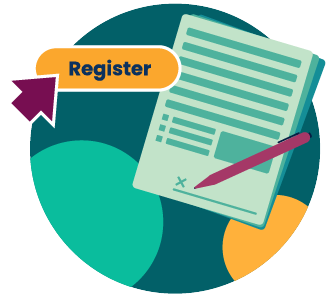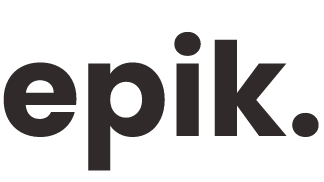
How to start a business
You’re inspired, excited and not sure where to start. We’re glad you found us! Get your domain, website,
professional email, phone number—and more—in one friendly platform, with Epik.
Guide to starting a business
Here at Epik, we love that you dream of being your own boss. Of building a future where you get to do what you love. Of enriching your community.
No matter where you find yourself on your business journey—whether you’re on the hunt for the perfect domain or weighing the benefits of an LLC—we’re here to lend a hand.
Here’s our step-by-step guide to starting your business off right.
STEP 1
Create a business plan
You’ve landed on a smart business idea (something you’re confident you won’t get tired of doing day after day) and the timing feels right. It’s time to start planning. This step can feel daunting, but it doesn’t need to be.
You probably don’t need a lengthy document right off the bat. Start with a concise, one-page overview that distills the ins and outs of your business:
- Who is your ideal customer?
- What are you selling, and how?
- How much will you charge?
- What’s your mission? (Why do you do what you do?)
- What sets your business apart from competitors?
- What are your startup expenses?
The answers to these questions can keep you on track later, as you work to get your venture off the ground. Turn to your mission statement for motivation when things get tough—and consider sharing your business plan with a few trusted friends to pinpoint any weak spots.
STEP 2
Choose a business name and secure a domain to match
Choosing the right name for your business is equal parts creativity and research. It’s thinking of a name that perfectly encapsulates your brand—and being prepared to go back to the drawing board if that name turns out to be taken.
A few rules of thumb:
- Your business name should be easy to spell and pronounce.
- It should give your business room to evolve over time.
- It should evoke your brand or clearly convey what you do—or both.
- If you’re starting an LLC or corporation, your official business name should contain an identifier, like “limited liability company” or “co.”
Once you have a business name in mind, start snooping. Go to your Secretary of State’s website to conduct a free business name search—and find out if your potential name is registered to another business in your state. Visit the U.S. Patent and Trademark Office (USPTO) to make sure it isn’t trademarked.
If your ideal business name is available, act fast. Most states allow you to reserve a business name for a fee—a good move if you’re not quite ready to launch, but want to be sure your name will still be there when you need it.
Next up is choosing a domain name for your website. Use our domain search tool to search for your business name—and see how close you can get. Your URL doesn’t have to perfectly match your business name, but keeping these names similar can help your customers to remember your brand and website.
It all starts with the perfect domain.
Take the first step in bringing your dream to life—with a fitting,
unforgettable web address.
STEP 3
Decide on a business structure
You know what your business is going to sell, and what you’re going to call it (half the battle won!). Now it’s time to decide what kind of legal structure will work best.
If you’re selling products or services as yourself—without a formal business structure—you’re already a sole proprietor, by default.
If you’re looking for more separation between your business and personal assets, forming an LLC or corporation is probably the right step. Let’s look at your options.

Sole Proprietorship
A sole proprietorship is your business’s default structure if you operate under your own name, without forming a legal entity like an LLC. With this setup, your business is essentially an extension of yourself.
As the least formal type of business, sole proprietorships offer simplicity and minimal upkeep. There’s no paperwork to file with the state, unless you want to operate under a different name (in which case you’d submit a DBA or “Doing Business As” statement).
The main downside of sole proprietorships is the risk to yourself. In the event of bankruptcy or legal action, there’s no separation between your business and personal assets—putting everything you own at risk. That’s why, when sales start picking up, most small businesses choose to transition to an LLC.

Limited Liability Company (LLC)
The LLC (limited liability company) is a flexible, business-friendly middle ground—between more formal structures like corporations, and simpler ones like sole proprietorships and partnerships. To start an LLC, you’ll file a document called Articles of Organization with your state and pay a one-time filing fee.
You’ll also need an official business name (good thing you’ve already chosen one!) and a registered agent—more on that below. LLCs offer a serious advantage by providing a layer of liability protection between yourself and your business, shielding you and your personal assets from risk.
If you need the protection of an LLC but you don’t need the extra paperwork, we’ve got you covered! Epik can prepare and submit your LLC paperwork for you—and we include a free domain for one year, plus a free trial of everything else you need to get established (business phone number, professional email, and more).

Corporation
The corporation is more formal than the LLC—and it’s an entity that projects success. If you’re aiming to attract investors, starting a corporation can help boost your credibility.
But with the added professionalism of an “inc” comes a little more paperwork. Corporations have more guidelines and record-keeping requirements to fulfill, like electing a board of directors, creating financial statements, and holding annual meetings.
That said, incorporating can still be the right choice—especially if you want to raise capital by selling shares. Like LLCs, corporations offer liability protection, limiting your personal risk as your business grows. And like LLCs—corporations are easy to form, with Epik.
Why settle for just an LLC when you could have more?
When you hire Epik to form your LLC or corporation, we set you up with everything you need to build your brand identity—including a free domain for one year, plus a free trial of web hosting, business phone service, professional email, & more.

STEP 4
Get a registered agent
If you’re forming an LLC or a corporation, you’ll need a registered agent in every state where you do business. This individual or entity acts as your business’s official point of contact for important legal notices.
When submitting your formation paperwork, you’ll designate your registered agent by providing their name and address. This information becomes part of your state’s public business records—which is why so many business owners choose a commercial registered agent service, instead of listing themselves as agent.
While being a registered agent might sound simple, it comes with its share of responsibilities, like being available during regular business hours. It also poses serious privacy risks. If you’d rather skip the hassle, we can help. Epik’s registered agent service includes same-day mail scans, the use of our business address to protect your privacy, and peace of mind from day one.
Want to launch your business all the way? Our registered agent service also includes a free domain name, and a no-strings-attached trial of professional email, phone service, website hosting, and more.
STEP 5
File your paperwork with the state
Once you’ve decided on the best legal structure for your business and you’ve found a registered agent, it’s time to file your formation paperwork. Note that this step only applies if you’re forming a legal business entity, like an LLC or corporation (sole proprietors aren’t required to register with the state).
Forming your LLC or corporation involves paying a one-time state fee, providing information about your business, and waiting for confirmation that your application was successful. If you’re a DIY-er, you can file your LLC or corporation paperwork yourself—we’re here to help with any questions along the way. Or, if you’d rather save yourself time and trouble, you can enlist Epik to file your paperwork for you.
STEP 6
Set up communication & marketing channels
Good communication is everything when you’re trying to start a business from scratch. As you get ready to launch, think about the main ways you’ll connect with leads and clients, and how they’ll reach out to you. A custom website, dedicated phone number, professional email address, and active social media presence will all be essential.

Business Phone Number
Using a separate, dedicated phone number for your business serves two purposes: it makes your business look more professional, and it keeps your personal number private.
Many small business owners are opting for virtual phone service: affordable, internet-powered phone numbers that work on your existing devices. Epik’s Phone Service is designed with small business owners in mind, providing you with an affordable, local business number you can list on your website and start using right away.

Professional Email Address
Email is still the preferred contact method for many. Setting up an email address that matches your domain, looks professional, and instills confidence should be a priority for your new business.
Your business email can also be pivotal in driving traffic to your website and building excitement for your business launch (especially with the help of a newsletter and mailing list).
All in all, it’s an indispensable tool, and Epik has you covered. Get a free trial of our Business Email Service—including 5GB of storage and up to 10 email addresses—when you hire Epik to start your LLC or corporation, or serve as your registered agent.

Social Media
Love it or hate it, social media has become a key way for brands to connect with their audience, initiate conversations, and drive traffic to their websites and storefronts. Engaging on social platforms is not just an option—it’s a necessity for businesses aiming to build a customer base.

Business Website
Every business needs a website—even if it’s a simple three-pager (Home, About Us, Contact). It gives you a place to tell your brand’s story and showcase your products and services. Whether you’re doing business online, in a brick-and-mortar store, or at farmer’s markets—your website will be a crucial point-of-contact and advertising tool.
The good news is, you don’t have to be a tech expert or spend a lot of money to get a beautiful, custom site. At Epik, we offer a free Web Hosting trial with every LLC and corporation we form. We’ll guide you through the setup until you’re satisfied—and you’ll have unlimited support to keep things running smoothly.



